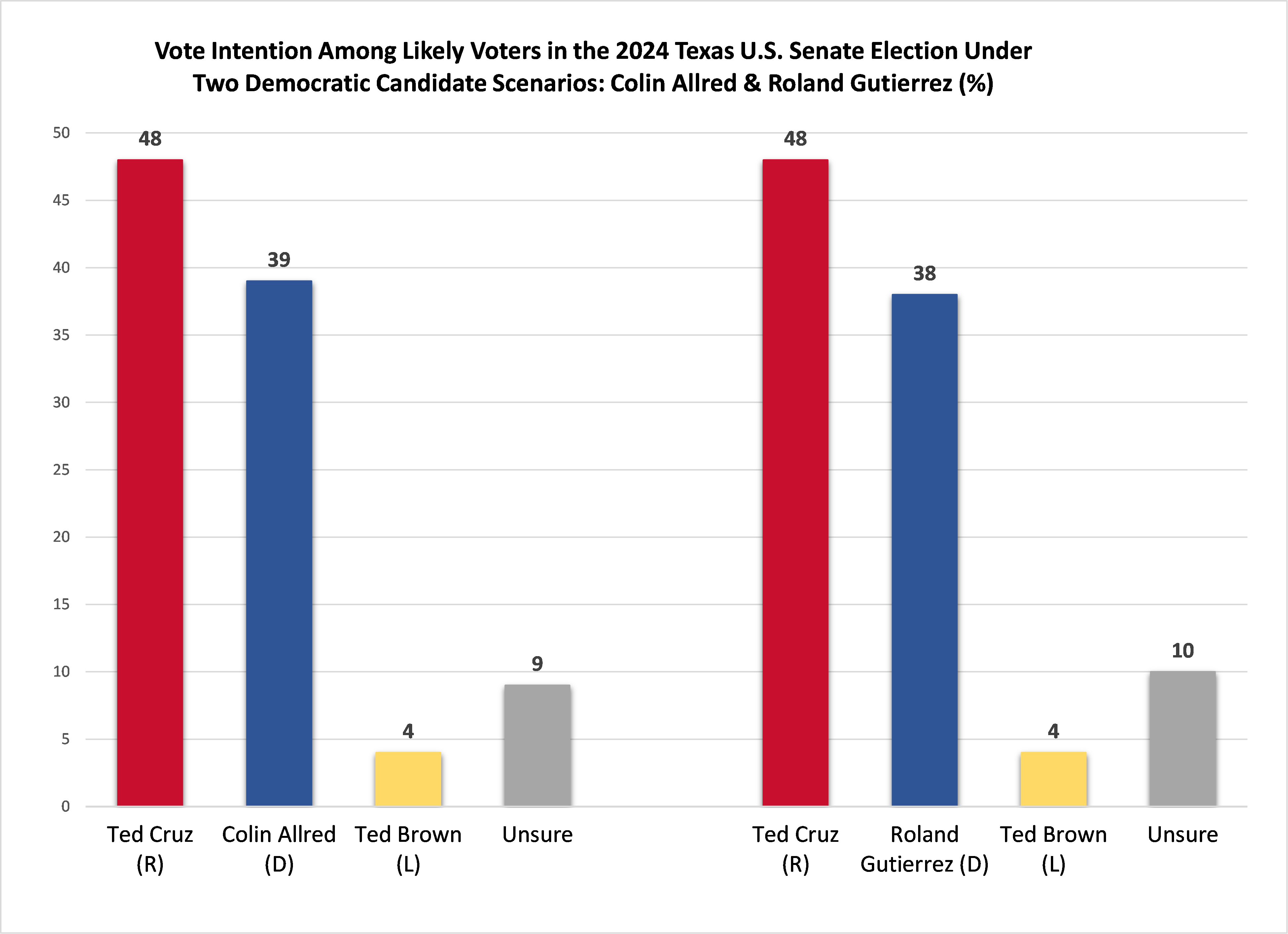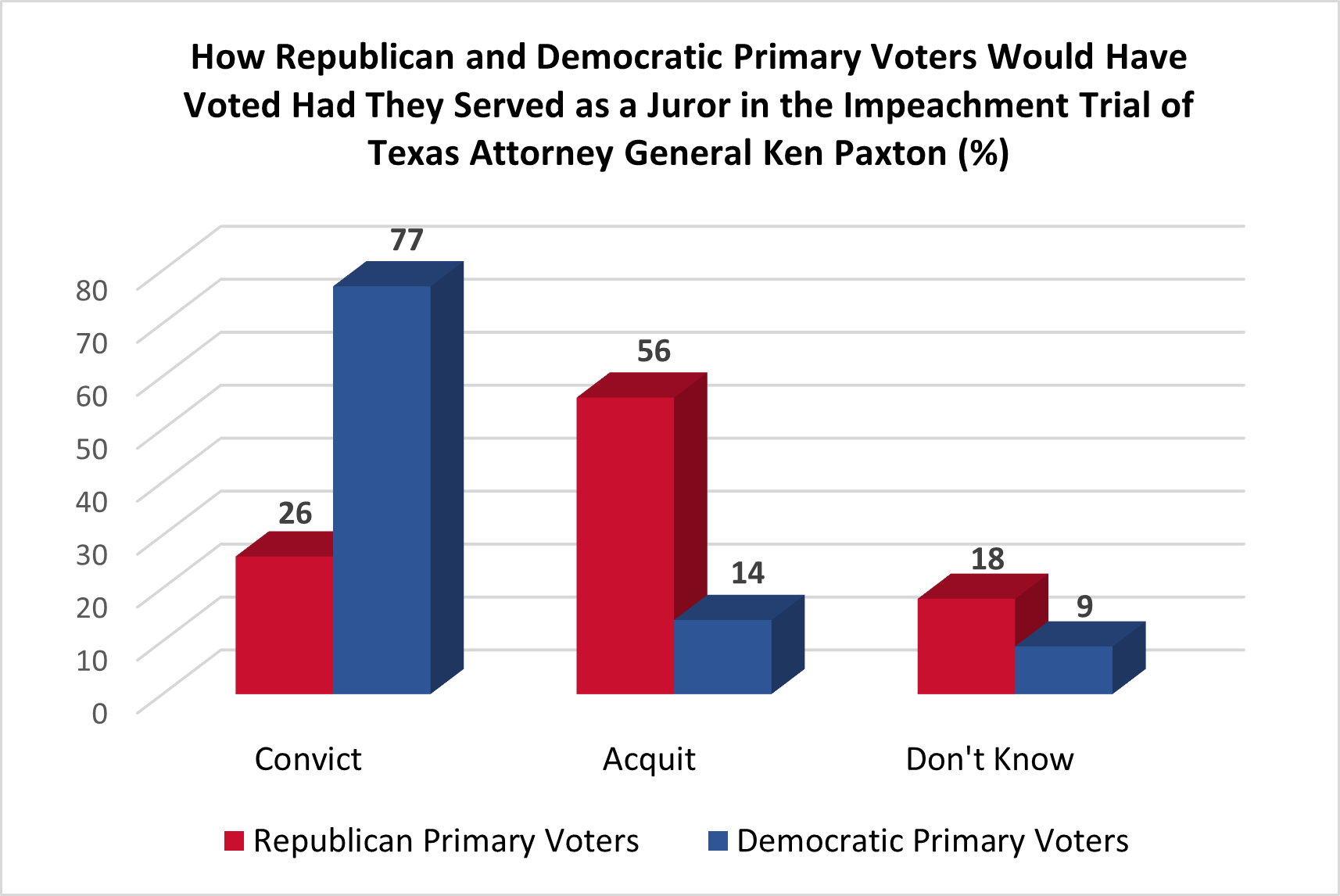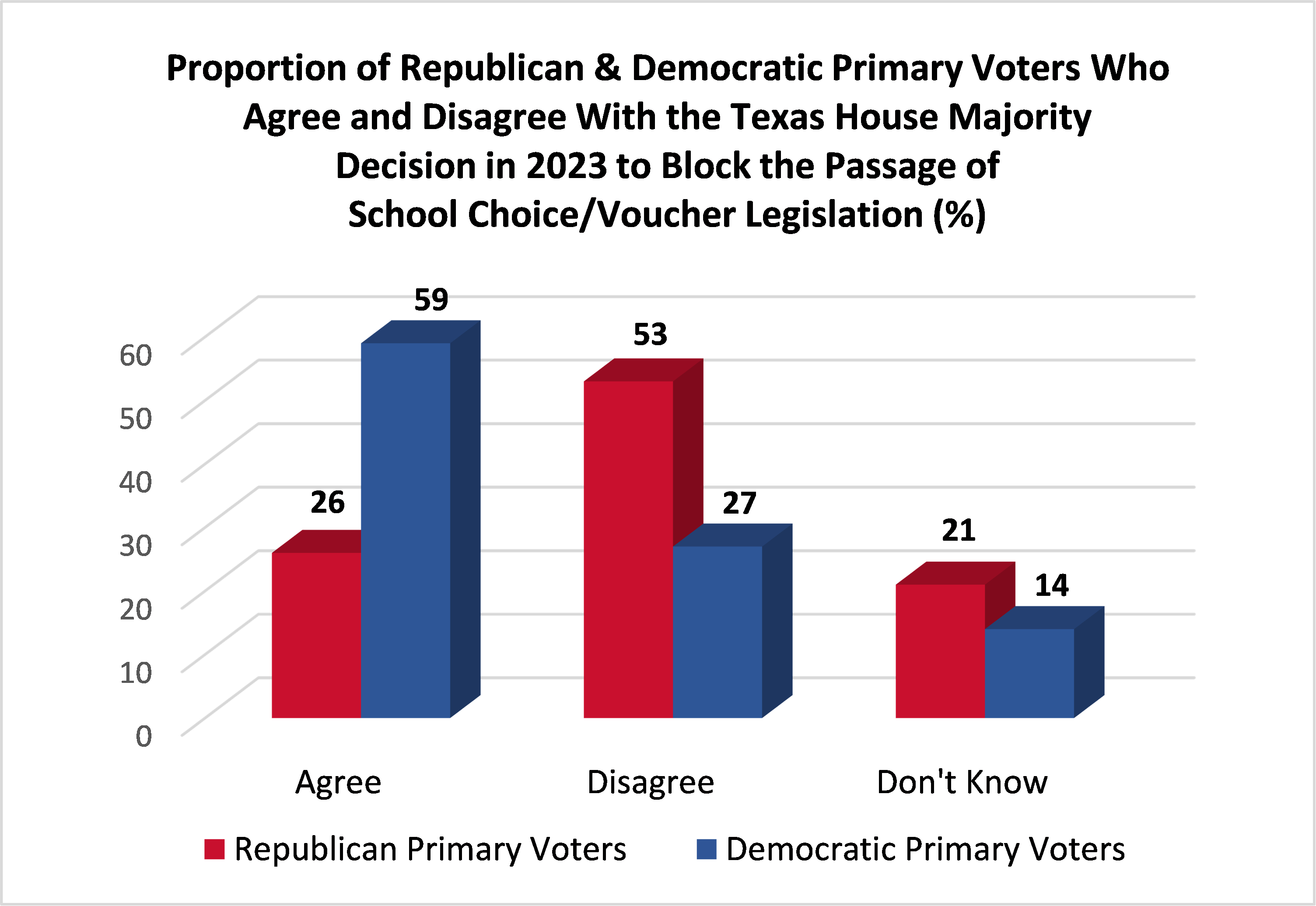Texas Primary Election 2024
On March 5, 2024, Texas joins 15 other states in determining their preferences for candidates vying for the presidency. While Super Tuesday voters will have the opportunity to make their voice heard about their party’s presidential candidate, they will also select their party’s nominees for a multitude of other positions, including those for the U.S. Senate, Congress, the Texas Legislature and local offices. Who has emerged as favorites among Texas voters? What factors are influencing voting decisions? Where do Texans stand today on the most hotly debated public policies and decisions in the Lone Star State?
In order to identify frontrunners and opinions during a highly charged election year, the Hobby School of Public Affairs at the University of Houston conducted an online survey of Texas registered voters between January 11 and January 24, 2024. The survey was fielded in English and Spanish with 1,500 YouGov respondents, resulting in a confidence interval of +/-2.5%. The respondents were matched to a sampling frame on gender, age, race/ethnicity, and education and are representative of the population of Texas registered voters.
The survey’s findings will be provided in four reports. The first report examines vote intention in the March 2024 Texas Republican and Democratic presidential primaries, vote intention in the November 2024 presidential election in Texas, opinions regarding the major candidates’ fitness to serve due to their advanced age and favorability evaluations of leading political figures. The second report focuses on vote intention in the March 2024 Texas Democratic U.S. Senate primary election and vote intention in the November 2024 Texas U.S. Senate election. The third report explores factors influencing Texas House Republican primaries, ranging from the voting record of incumbent legislators to the endorsements of high-profile Republicans, with additional examination of the GOP Texas Court of Criminal Appeals primary elections. The fourth report analyzes public opinion regarding school choice/school vouchers and the 2023 impeachment trial of Texas Attorney General Ken Paxton.
Report 1. Presidential Candidates
Highlights
In the March 2024 Texas Republican presidential primary election, Donald Trump holds a more than 60 percentage point lead over Nikki Haley, 80% to 19%.

Trump’s vote intention is highest among likely Republican primary voters whose highest level of educational attainment is a high school degree or less (91%) or a two-year degree or some college (87%) and who are a born-again Christian (88%) and who are Latino (86%).
In the 2024 Texas Democratic presidential primary election, Joe Biden holds a more than 65 percentage point lead over Marianne Williamson, 72% to 5%, with 17% of likely voters undecided.
55% of Latino likely Democratic primary voters say that if the election were today, they would vote for Biden, compared to 78% of white and 79% of Black likely voters.
If the general election were held today, 49% of likely Texas voters would support Donald Trump, and 40% would support Joe Biden, with the remainder supporting third party candidates (4%) or unsure (7%).

Trump holds a significant lead over Biden among men (53% to 38%), while the two are effectively tied among women (44% to 43%).
48% of Texas voters have a favorable opinion of Donald Trump, and 51% have an unfavorable opinion.
39% of Texas voters have a favorable opinion of Joe Biden, and 59% have an unfavorable opinion.
72% of voters in Texas believe Biden is too old to effectively serve another term while 40% of the state’s voters believe Trump is too old to effectively serve another term.
More than nine out of ten Trump voters support Texas Governor Greg Abbott’s policies of spending $3 billion of Texas tax dollars annually on border security (92%) and empowering Texas law enforcement to arrest undocumented immigrants (93%).
88% of Biden voters and 64% of Trump voters support legislation to require a person to be 21 years old to purchase an AR-15-style assault rifle in Texas.
Read Report 1 to learn more about where Texans stand on the 2024 primary election candidates and issues, including differences of opinion when considering gender, age, race/ethnicity, education and partisanship.
Media Release January 30, 2024
Report 2. Democratic Candidates for the U.S. Senate
Highlights
Among likely voters in the 2024 Texas Democratic Party U.S. Senate election, Congressman Colin Allred holds a 40% to 12% lead over Texas State Senator Roland Gutierrez, who is followed by Meri Gomez (4%), Mark Gonzalez (2%), Carl Sherman (1%), A. “Robert” Hassan (1%), Steven Keough (1%), Heli Rodriguez Prilliman (1%) and Thierry Tchenko (0%). 38% of likely voters remain undecided.

In a hypothetical Democratic primary runoff election, Allred’s vote intention (46%) is 20 percentage points greater than that of Gutierrez (26%), with 28% undecided. Allred enjoys a substantial lead over Gutierrez among white (57% to 16%) and Black (54% to 19%) likely voters, while Gutierrez leads among Latinos (41% to 25%). In terms of generational support, Allred enjoys a substantial lead over Gutierrez among Silent Generation/Baby Boomer (56% to 18%) and Gen-X (49% to 21%) likely voters, while Gutierrez leads among Millennials/Gen-Z (42% to 28%).
In a November 2024 U.S. Senate election where Allred is the Democratic candidate, Republican U.S. Senator Ted Cruz leads Allred by 9 points, 48% to 39%, with Libertarian Ted Brown with 4% and 9% undecided.
In a hypothetical U.S. Senate general election with Gutierrez as the Democratic candidate, Republican U.S. Senator Ted Cruz leads Gutierrez by 10 points, 48% to 38%, with Libertarian Ted Brown with 4% and 10% undecided.

Read Report 2 to learn more about where Texans stand on the 2024 primary election candidates for the U.S. Senate, including differences of opinion when considering gender, age, race/ethnicity and education.
Media Release January 30, 2024
Report 3. Influences in State House Republican Primary Races
Highlights

Six in ten (60%) of Republican primary voters would be less likely to vote for an incumbent Texas House representative who cast a legislative vote against school choice/vouchers in 2023.
46% of Republican primary voters would be less likely to vote for an incumbent House representative who cast a legislative vote in favor of the articles of impeachment against Texas Attorney General Ken Paxton in 2023.
Nearly nine out of 10 (86%) likely Republican primary voters would be more likely to cast a ballot for a House incumbent who voted for legislation to make illegal immigration a state crime.
An endorsement by former President Donald Trump holds the most sway among Republican primary voters, with 70% of them more likely to vote for a Texas House candidate with his backing.

60% of Republican primary voters would be less likely to vote for an incumbent Court of Criminal Appeals judge who ruled in 2021 that the Texas Attorney General cannot unilaterally prosecute voter fraud.
More than three-quarters of Texas Republican primary voters have a favorable opinion of Donald Trump (79%), Greg Abbott (77%) and Ted Cruz (76%).
Read Report 3 to learn more about where Texas Republican primary voters stand on political figures and factors influencing their 2024 primary election decisions, including differences of opinion when considering gender, age, race/ethnicity, education, religion, region and ideology.
Media Release February 6, 2024
Report 4. School Vouchers & the Attorney General Impeachment Trial
Highlights
56% of Republican primary voters and 14% of Democratic primary voters familiar with the 2023 impeachment trial of Texas Attorney General Ken Paxton would have voted to acquit him if they had served as jurors at his trial.
77% of Democratic primary voters and 26% of Republican primary voters familiar with the 2023 impeachment trial of Texas Attorney General Ken Paxton would have voted to convict him if they had served as jurors at his trial.

53% of Republican primary voters and 27% of Democratic primary voters disagree with the 2023 majority decision in the Texas House to block the passage of school choice/voucher legislation.
59% of Democratic primary voters and 26% of Republican primary voters agree with the 2023 majority decision in the Texas House to block the passage of school choice/voucher legislation.

Read Report 4 to learn more about where Texas Republican and Democratic primary voters stand on school vouchers and the impeachment of the Texas Attorney General, including differences of opinion when considering gender, age, race/ethnicity, education and region.
Research Co-Investigators
Renée Cross, Senior Executive Director & Researcher, Hobby School of Public Affairs
Mark P. Jones, James A. Baker III Institute for Public Policy's Fellow in Political Science, Rice University; Senior Research Fellow, Hobby School of Public Affairs
Research Team
Maria P. Perez Argüelles, Research Associate, Hobby School of Public Affairs
Savannah Sipole, Research Associate, Hobby School of Public Affairs
Agustín Vallejo, Post-Doctoral Fellow, Hobby School of Public Affairs